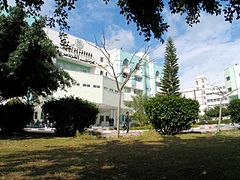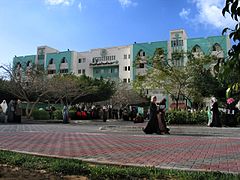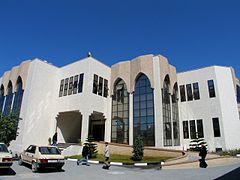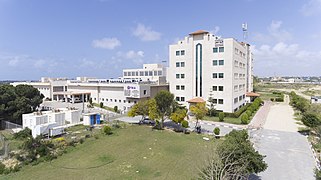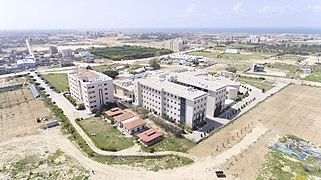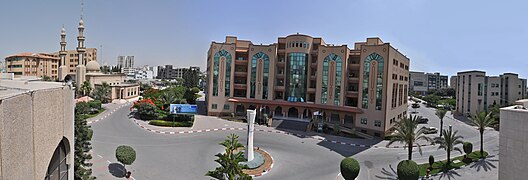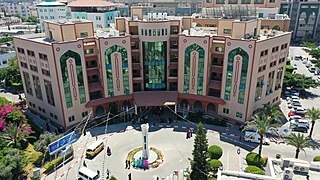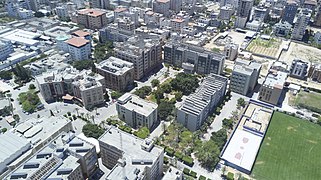Islamic University of Gaza
الجامعة الإسلامية غزة | |
 | |
| Type | Public |
|---|---|
| Established | 1978 |
| President | Prof. Nasser Ismail Farahat[1] |
Academic staff | 307 |
| Students | 17874[2] |
| Undergraduates | 16212 |
| Postgraduates | 1662 |
| Location | , |
| Colors | White and green |
| Website | www.iugaza.edu.ps |
The Islamic University of Gaza (Template:Lang-ar), also known as IUG and IU Gaza, is an independent Palestinian university established in 1978 in Gaza City.[3] It was the first higher education institution to be established in Gaza Strip.[3] The university has eleven faculties capable of awarding BA, BSc, MA, MSc, MD, PhD, diplomas and higher diplomas,[3][4] in addition to twenty research centers and institutes and the affiliated Turkish-Palestinian Friendship Hospital.[3][5]
The Islamic University of Gaza is a member of twelve regional and international associations and networks of higher education,[6] including the International Association of Universities (IAU),[7] Mediterranean Universities Union (UNIMED),[8] Association of Arab Universities (AAU),[9] Federation of the Universities of the Islamic World (FUIW),[10] Black Sea and Eastern Mediterranean Academic Network (BSEMAN),[11] and the Global University Network for Innovation-GUNi.[12]
A large part of the Islamic University of Gaza was damaged by air strikes during the 2008-2009 Gaza war and the 2014 Israel–Gaza conflict.[13]
History
No universities or higher education institutions existed in the occupied West Bank and Gaza Strip until 1972.[14][15] Before then, Palestinian high school graduates sought higher education abroad, mostly in Egyptian and Jordanian universities. However, the restrictions on student movements after the Israeli occupation of West Bank and Gaza Strip in 1967, the declining economic conditions, and the increasing limitations on the admission of Palestinian students to Arab universities changed this situation.[16] As such, local initiatives led by local elders and social and nationalist leaders sought to establish national higher education institutions in the occupied territories, often building on already existing schools and colleges.[16]
Sheikh Mohammad Awwad, then head of the Gaza Chapter of the Azhari Institute, led the Islamic University’s founding committee. On 12 April 1978, the committee issued a decree to establish the University, which was composed of three faculties: Sharia, Usool-Deen, and Arabic Language (which later evolved into the Faculty of Arts).[17] The University was later inaugurated in November 1978 as an independent, nonprofit University, which was also the first higher education institution in the Gaza Strip.[18] The Faculty of Education was founded in 1980, while the Faculties of Commerce and Arts were founded the following year. The Faculties of Nursing and Engineering were founded in 1993. In 2005, the Faculty of Information Technology was founded, followed by the Faculty of Medicine in 2006.[17]
| Name | Service Years |
|---|---|
| Mohammad Awwad | 1978-1994 |
| Jamal Al-Khoudari | 1994-2014 |
| Nasr al-Din Al-Muzaini | 2014-2022 |
| Mohammad Al-Aklouk | 2022 - To date |
The Islamic University was subjected to the different Israeli restrictions against Palestinian universities, which the Palestinians perceived as centres of political struggle and nation-building.[16] The establishment of the Faculty of Nursing, intended in 1986, was denied by Israeli authorities until 1993. Building permits were stalled and limited. Also, similar to other universities, the Islamic University was subjected to severe restrictions on academic freedom such as limitations of staff movement and Military Order 854. It was also issued with a temporary license that required annual renewal, and denied tax exemptions.[16][19]
Campus


The Islamic University of Gaza is considered a large university (uniRank enrollment range: 15,000-19,999 students).[20] The main campus is located in Gaza City, with branch campuses in Khan Yunis in the southern Gaza Strip and Al Zahra in the middle of Gaza Strip. The Al Zahra campus is home to the Faculty of Medicine and the Turkish-Palestinian Friendship Hospital.[20][15]
Rankings
| Category | Rank | Year | Ranking |
|---|---|---|---|
| Global Impact Rankings | 801-1000th | 2022 | Times Higher Education |
| Arab University Impact Rankings | 91-100th | 2022 | Times Higher Education |
| Overall percentile | 84th | 2022 | Scimago Institutions Rankings |
| Research percntile | 69th | 2022 | Scimago Institutions Rankings |
| Innovation percentile | 91st | 2022 | Scimago Institutions Rankings |
| Societal percentile | 70th | 2022 | Scimago Institutions Rankings |
| Country rank | 4th | 2022 | UniRank |
| World rank | 2542 | 2022 | UniRank |
Memberships and Affiliations
IUG is a recognized member of twelve regional and international associations and networks of higher education:[20]
- Anna Lindh Euro-Mediterranean Foundation
- Association of Arab Universities (AAU)
- Community of Mediterranean Universities (CMU)
- Eurasian Universities Union (EURAS)
- Euro-Mediterranean Universities Consortium TETHYS
- Federation of the Universities of the Islamic World (FUIW)
- International Association of Universities (IAU)
- Mediterranean Universities Union (UNIMED)
- Peace Programme
- Réseau Méditerranéen des Ecoles d'Ingénieurs (RMEI)
- The Euro-Mediterranean University (EMUNI)
- Black Sea and Eastern Mediterranean Academic Network (BSEMAN)
The university has also developed partnerships with 142 higher education institutions around the world.[15]
Donor institutions
The university has accepted donations from institutions such as the Arab Student Aid International, United Palestinian Appeal, Islamic Relief, the British Council, the World Bank, the Islamic Development Bank and Human Appeal International.
The university has accepted donations from the Middle East Children's Alliance for its rebuilding efforts.[22]
Faculties
The Islamic University of Gaza has eleven faculties:[23]
- Faculty of Commerce: majors are in accounting, business administration with emphasis on economics and political science or banking and finance, economics & applied statistics, accounting (in English), and business administration (in English).
- Faculty of Education: majors are in science education, psychological science, primary education (elementary level), psychological counselling & educational guideline, applied science & education technology, Islamic studies, Arabic language, English language, geography, social studies, history, computer education, chemistry, mathematics, physics, biology
- Faculty of Arts: Arabic language, English language, geography, journalism & information, journalism/editing, journalism & information./public relations & administration, social services, history & archaeology, Arabic & journalism
- Faculty of Shariah and Law: Islamic Shariah, Shariah & law
- Faculty of Ussol Eldeen: Usul AL-Din / General
- Faculty of Medicine: The faculty was inaugurated in 2006, and the first class graduated in 2012. Study consists of six years, with three years in each of the basic and clinical training levels. Medical graduates are awarded a Doctor of Medicine (M.D.) degree. The faculty is listed in the World Directory of Medical Schools and the Foundation of International Medical Education Directory (FAIMER). It is also recognized by the UK General Medical Council (GMC).[24] In addition to the M.D. program, the faculty hosts several post-graduate diplomas, and is a recognized test center for the International Foundations of Medicine (IFOM) exams.[25]
- Faculty of Engineering
- Faculty of Information Technology
- Faculty of Nursing
- Faculty of Science
- Faculty of Health Science
Postgraduate studies
The Islamic University of Gaza awards Master of Science and Master of Arts degree in the following areas and majors:
- Faculty of Engineering awards master's degrees in the following majors: (civil engineering/infrastructure, civil engineering/construction management, civil engineering/structure, design & rehabilitation of structures, electrical engineering/control systems, water resources engineering, civil engineering/construction management.
- Faculty of Medicine offers post-graduate diplomas in Child Health and Nutrition for Physicians (DCHN), Anesthesia and Intensive Care, Emergency Medicine, Obstetrics and Reproductive Health, Vascular Surgery, and Disaster Management for Health Professionals.[26]
- Faculty of Science awards master's degrees in the following majors: mathematics, physics, water resources management. Also, the faculty of science awards masters in biological sciences with concentration on the following areas: zoology, microbiology, medical technology, botany and mycology.
- Faculty of Commerce awards a Master of Arts degree in the two main majors of accounting and finance, and business administration. The business administration has the following concentrations: human resource management, marketing management, and financial management.
- Faculty of Education awards a Master of Arts in the following majors: psychology, curricula and methodology, fundamentals of education, and rehabilitation sciences. The curricula and methodology has the following concentrations: mathematics, Arabic language, sciences, English, and instructional technology. The fundamentals of education has the following concentrations: Islamic education and educational administration.
- Faculty of Art awards a Master of Arts degree in the following majors: literature, rhetoric and criticism, modern history, and Islamic history.
- Faculty of Shariah and Law awards a Masters of Arts in the majors of foundations of jurisprudence, comparative jurisprudence, and Islamic jurisdicrion.
- Faculty of Ussoul Eldeen awards a Master of Arts in the majors of hadith, aqidah, and Quran and their interpretation.
February 2007 incident
During fighting between Hamas and Fatah, the dominating party in the Palestine Liberation Organization (PLO), in February 2007, Fatah militia stormed the university and confiscated weapons and ammunition that were stored in the university. Palestinian television aired footage showing dozens of rocket-propelled grenade launchers, rockets, and assault rifles, as well as thousands of bullets which had been found inside the university.[27][28]
Damage by Israeli air strikes
Just after midnight on 28/29 December 2008 local time, the university was bombed in six air strikes by the Israeli Air Force during the 2008 Gaza War. An Israeli army spokeswoman told The Chronicle of Higher Education that university facilities were being used by Hamas to develop and store weapons including Qassam rockets used to target Israeli civilians. Hamas denied the Israeli allegation.[27][29] According to claims by the Israeli-based International Policy Institute for Counter-Terrorism, Hamas uses the university's laboratories to research and develop the Qassam rockets, in order to extend its range and lethality.[30]
The United Nations Fact Finding Mission on the Gaza Conflict examined the incident and disputed the Israeli claims, concluding that: "the mission also saw the destruction caused at the Islamic University and in other university buildings that were destroyed or damaged. These were civilian, educational buildings and the Mission did not find any information about their use as a military facility or their contribution to a military effort that might have made them a legitimate target in the eyes of the Israeli armed forces."[31]
Palestinian academics claim that the attack destroyed 74 labs, including, Microbiology, Hematology, Genetics, Medical Technology and Medical Chemistry Labs, Physics Labs, Environmental and Earth Sciences Labs, Biology Labs, Biotechnology Labs, Optics Labs, Chemistry Labs, Engineering Labs, and Engineering and IT buildings.[22]
In its response to the strike, the university announced in a press release on January 21, 2009, that the university is an independent institution of higher education in Gaza and the largest among the Palestinian institutions that serve 20,000 students as an accredited member of several regional and international academic associations and organization. According to the press release, the attack destroyed the Science and Engineering buildings and damaged several others. The university called upon academics, local, regional and international higher educational and human rights institutions to speak out against the attacks.[32] A number of international academic institutions have proceeded to express their commitment to support IUG as well as other universities in Gaza. The International Association of Universities, of which IUG is a member, has claimed to have written to the university to express its deep concern over the effects of the war, and to be ready to mobilize its member universities in support of the rebuilding efforts of the university. Similarly, Prof. Espen Bjertness of the University of Oslo and member of the Steering Committee of PEACE,[33] stressed that “the sad situation for all academics caused by the bombing of our member university, Islamic University, Gaza and of the Gaza Community Mental Health Program calls for appropriate action”.[34]
A large part of the university was also damaged by air strikes during the 2014 Israel–Gaza conflict. The Israeli army said it targeted a "weapon development" centre in the university.[35]
Relationship with Hamas
The Islamic University was co-founded by one of the future founders of Hamas, Sheikh Ahmed Yassin,[36] in 1978. The Washington Institute for Near East Policy wrote in a piece on USAID funding of organisations with possible links to terrorism that connections exist between the university and Hamas.[37]
Arguing against such ties were Marcy Newman and Akram Habeeb, who wrote for the Middle East Children's Alliance in 2009: "equally important for our American colleagues is to remove the false label that IUG is a "Hamas-controlled" institution. Just as Palestinians in Gaza belong to a variety of political parties, IUG's students, board, faculty and staff represent that reality. IUG is a university like any other in the Palestinian Territories that reflects the diversity of its population."[22]
Steven Erlanger, former Jerusalem bureau chief of the New York Times, described the IUG as "one of the prime means for Hamas to convert Palestinians to its Islamist cause,"[28] in a 2007 article about further Israeli airstrikes on the university. This report was criticised by political economist Sara Roy of Harvard University, who explicitly stated that 'there can be no question that Hamas works within the framework of Islamic institutions in the Gaza Strip, and that there are certain direct links between Hamas and many of the social and economic institutions (in the strip). ... However, it is far more questionable whether an automatic and inevitable link exists between Hamas and Islamic social and economic institutions, whether those links are inherently subversive, or whether such institutions promote radicalism and violence as is commonly assumed." Roy also writes: "logic maintains, institutional clients become automatically linked to Hamas and constitute a base of support for political Islam. As a result, Islamic social institutions become recruiting centers for the Hamas's military wing. There is however, little hard evidence to support any of these allegations.[38]
Copyright controversy
In July 2008, The Hook, a magazine in Charlottesville, Virginia, reported that the University of Virginia had taken legal action against the Islamic University of Gaza for allegedly purloining the website design of the University of Virginia.[39]
Gallery
See also
References
- ^ "Welcome from the president". The Islamic University Gaza. Retrieved 12 January 2020.
- ^ "About IUG". The Islamic University Gaza. Retrieved 12 September 2022.
- ^ a b c d "Islamic University of Gaza". Times Higher Education (THE). 2021-11-12. Retrieved 2022-10-02.
- ^ "About IUG – الجامعة الإسلامية بغزة". Retrieved 2022-10-02.
- ^ "Islamic University Takes Up the Turkish-Palestinian Friendship Hospital – الجامعة الإسلامية بغزة". Retrieved 2022-10-02.
- ^ "Islamic University of Gaza is a permanent member of Global University Network for Innovation – الجامعة الإسلامية بغزة". Retrieved 2022-10-02.
- ^ "List of IAU Members - IAU". www.iau-aiu.net. Retrieved 2022-10-02.
- ^ "Adherents". Cmungo (in Italian). Retrieved 2022-10-02.
- ^ "اتحاد الجامعات العربية". www.aaru.edu.jo. Retrieved 2022-10-02.
- ^ "Islamic University of Gaza". Archived from the original on 2011-07-25. Retrieved 2009-01-22.
- ^ Admin, Bseman. "Members". Bseman. Retrieved 2022-10-02.
- ^ "Institutional members". Guni Network. Retrieved 2022-10-02.
- ^ "Israel strikes university in Gaza City". Al Jazeera. Retrieved 3 June 2015.
- ^ Angrist, Joshua D. (1995). "The Economic Returns to Schooling in the West Bank and Gaza Strip". The American Economic Review. 85 (5): 1065–1087. ISSN 0002-8282.
- ^ a b c d "Islamic University of Gaza". Times Higher Education (THE). 2021-11-12. Retrieved 2022-12-01.
- ^ a b c d "PIJ.ORG: Palestinian University Education under Occupation By Gabi Baramki". PIJ.ORG. Retrieved 2022-11-17.
- ^ a b "لمحة تاريخية – الجامعة الإسلامية بغزة" (in Arabic). Retrieved 2022-11-17.
- ^ "Islamic University of Gaza". Top Universities. Retrieved 2022-11-17.
- ^ ASSAF, Said (1997). "Educational disruption and recovery in Palestine" (PDF). UNESCO International Bureau of Education. pp. 57–58.
{{cite web}}: CS1 maint: url-status (link) - ^ a b c d "Islamic University of Gaza | Ranking & Review". www.4icu.org. Retrieved 2022-12-01.
- ^ "Islamic University of Gaza Ranking". www.scimagoir.com. Retrieved 2022-12-01.
- ^ a b c Akram Habeeb and Marcy Newman (February 16, 2009). "Rebuilding the Islamic University of Gaza". Electronic Intifada.
- ^ "Islamic University of Gaza :: Faculties". www.iugaza.edu.ps. Retrieved 2021-08-01.
- ^ "Islamic University of Gaza :: Faculty of Medicine > Faculty > Accreditations and Partnerships". medicine.iugaza.edu.ps. Retrieved 2021-08-01.
- ^ "About the IFOM Center – كلية الطب". Retrieved 2023-02-08.
- ^ "Islamic University of Gaza :: Faculty of Medicine > Academic Study > Post-Graduation > Higher Diplomas". medicine.iugaza.edu.ps. Retrieved 2021-08-01.
- ^ a b "IRAN'S GAZA GOONS CAUGHT AT HELM OF BOMB FACTORY," by ANDY SOLTIS with Post Wire Services, New York Post, Feb. 3, 2007 [1] Archived 2008-12-04 at the Wayback Machine
- ^ a b "Gaza is hit with more Israeli airstrikes," by Steven Erlanger, New York Times, Friday, May 18, 2007 [2] Archived 2016-07-22 at the Wayback Machine
- ^ Jerusalem Post, Dec 29, 2008, IAF bombs Islamic University's R&D labs, By YAAKOV KATZ [3][permanent dead link]
- ^ Fighel, Jonathan (2009-02-01). "The Mujaheed Sheikh - Dr. Nizar Rayyan The Spiritual Mentor of Iz A-Din Al Qassam Brigades". International Policy Institute for Counter-Terrorism. Retrieved 2009-05-31.
- ^ "United Nations Fact Finding Mission on the Gaza Conflict". Archived from the original on June 7, 2009.
- ^ "Islamic University of Gaza". Archived from the original on 2011-07-25. Retrieved 2009-01-22.
- ^ "P.E.A.C.E. Programme". Archived from the original on 2013-01-29. Retrieved 3 June 2015.
- ^ "P.E.A.C.E. Programme". Archived from the original on 2012-03-04. Retrieved 3 June 2015.
- ^ "Israel strikes university in Gaza City". Al Jazeera. Retrieved 3 June 2015.
- ^ December 29, 2008, "Israeli Airstrikes in Gaza Destroy 2 University Buildings," Chronicle of Higher Education [4] Archived 2012-10-13 at the Wayback Machine
- ^ August 24, 2007, "Better Late Than Never: Keeping USAID funds out of terrorist hands", Washington Institute for Near East Policy [5] Archived 2007-10-07 at the Wayback Machine
- ^ Sara Roy, Failing Peace, 2007, Pluto Press: London
- ^ "Copycat U: UVA fends off imitators". Retrieved 2008-08-23.


